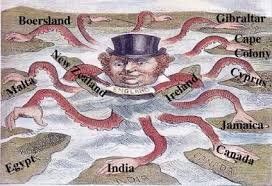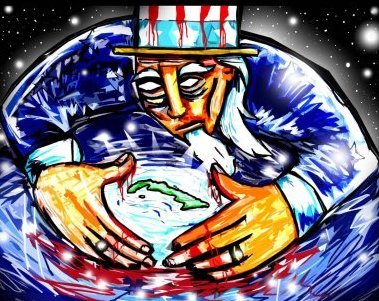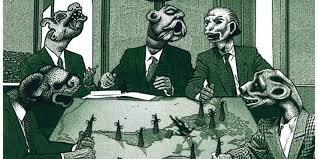The criticism of Western policy by the so-called free press within narrow bounds has subtle effect of imposing the hegemonic doctrine of imperialism, serves the western dominant intellectual culture and its institutions, says Professor Noam Chomsky in a conversation with Hassan Mirza. This is the second instalment of the three-part article by Mr Mirza, based on the correspondence he had with Prof Chomsky during the last four years.
Media, intellectuals and imperialism
Hassan Mirza (HM): In a famous BBC interview of yours with presenter Andrew Marr, you told him that if he believed in something different and was more independent-minded he wouldn’t have been hired by the BBC. He called you a conspiracy theorist after that. Is the western press not free enough?
Noam Chomsky (NC): As I have documented, and others have far more extensively (MediaLens, Jonathan Cook, etc.), The Guardian does provide criticisms of Western policy that go beyond the right-wing press (along with the Financial Times, The Independent, sometimes others), just as the New York Times, Washington Post, Bloomberg BusinessWeek, sometimes the Wall Street Journal and others do here. But with rare exceptions by individual columnists – like Jonathan Steele, Robert Fisk, Alexander Cockburn, a few others – it keeps within narrow bounds. Innumerable illustrations have been given in print. The liberal press typically is somewhat critical, but “this far and not a millimeter farther.” That’s better than a totalitarian press of course, but it also has the subtle effect of imposing hegemonic doctrine by implying that there is a free and lively debate, when in fact it takes place almost entirely within narrow bounds supportive of such doctrine.
I and others have written extensively about this. We see it every day. Phebe Marr, for example, might well have joined the extreme left of the critics of the Iraq war, like the international relations scholars who signed an open letter in late 2002 warning that “War with Iraq is not in the US national interest,” an act regarded as so intrepid and extreme that they have since been excluded from relations with the government (quoting a leading liberal critic in the New York Times today). That would not have prejudiced his position. But suppose he had told the simple truth (which I presume he does not believe, if he even understands it): national interest or not, the war was a textbook example of the “supreme international crime” of aggression without pretext (quoting from the Nuremberg Tribunal, where Nazi war criminals were hanged for lesser crimes than this).
 Many other examples, daily. No conspiracy theories, just simple truths about the dominant intellectual culture and its institutions.
Many other examples, daily. No conspiracy theories, just simple truths about the dominant intellectual culture and its institutions.
HM: About the culture of intellectuals serving power, this phenomenon is not new at all. I know that India was a Persianate for many centuries before the British colonisation. If one reads the history of that era of India (and of neighbouring Persian cultures of Iran, Ottoman, and Central Asia) the derogatory Persian term ‘Darbari Mullah’ (court mullah), ‘Darbari Danishwar’ (court intellectual), ‘Darbari Moa’arikh’ (court historian) routinely come up. These learned men, darbaris or courtiers, always served power.
NC: You’re quite right about intellectuals serving power. I didn’t know about the classical India case, but it’s not surprising. I’ve written about the western history, back to classical Greece (where the man who was accused of “corrupting the youth” by raising disturbing questions was forced to drink the hemlock) and the Bible, where those who condemned the acts of the evil kings (the so-called “prophets,” a bad translation of an obscure Hebrew word) were imprisoned, driven into the desert, vilified, while the flatters at the court (centuries later called “false prophets”) were honoured. Runs through history.
HM: How much is western imperialism responsible for the rise of Islamist terror?
NC: Western responsibility is enormous. Merely to take one example, consider ISIS, a direct outgrowth of the worst crime of the century, the US-UK invasion of Iraq, which among other crimes instigate ethnoreligious conflict that is now tearing the region apart. Only one recent example.
HM: What do you make of Bernard Lewis’s narrative that the roots of Muslim/Arab rage and Islamist terror lie in the backwardness of us Muslims and our inability to reform ourselves according to modern times? Does this argument make sense?
NC: Why should society be backward when it has an imperial boot on its neck.
HM: I discovered this interesting timeline of US-UK support for Islamist groups. I thought it all started in the 1970s with US support for the Afghan jihad. But it appears that since the 1950s the US was instigating extremist Muslim groups in Central Asia and the Middle East against the Soviets and moderate Arab nationalists.
NC: Robert Dreyfuss’s book is important. There’s a very good British counterpart: Mark Curtis, Secret Affairs.
HM: The British government routinely covers up war crimes committed during the wars in Iraq and Afghanistan. Is there any resistance to British crimes in their society? Terry Eagleton, the famous Marxist professor, said that there are less and less of the number of critics in the UK who actually criticise their society and the crimes of their government.
NC: The worst war crimes are traceable to the high command. My impression is the opposite of what you cite. I think there is more willingness than in the past to investigate, recognise, and condemn crimes of empire. Nowhere near enough, but at least something.
HM: I think Eagleton was talking about public intellectuals, he was saying that for many years now the intellectual classes in the UK are less and less self-critical. He was not talking about the public.
NC: I’m not aware of when they were self-critical. In fact, they were highly quiescent and supportive of power, more so than today, I think.
HM: Is it not well known in the American and British press and academia that Winston Churchill was in favour of using poisonous gas against different tribes (you pointed this out in a lecture) and that he played a massive role in the killings of millions of Bengalis in India during the Bengal famine of the 1940s? He is still lionised by Anglo-American conservatives.
NC: It’s all well-documented in scholarly sources and even published in the press. One can’t keep people from lying.
HM: Recently a new book, Churchill: Walking with Destiny, was published by a British historian named Andrew Roberts. It is full of praises for Churchill but has no mention of his atrocities. And the book got top reviews from major Anglo-American press and Stanford University’s Hoover Institute.
NC: He’s a well-known apologist for imperialism. Not the only one. Hoover Institute is a gathering place for reactionaries.
HM: In Europe, people do not know much about Nazi-like acts committed by the British in India. How can one make these basic facts about British imperialism more popular?
NC: In general, quite true, but it’s changing. Madhusree Mukerjee’s excellent book, Mike Davis’s book on Victorian famines, Richard Gott’s history of British crimes, and others have made some impact, though there’s a long way to go. I once looked up the entry for King Leopold in the famous 11th edition of the Britannica. Very laudatory, with a comment that he sometimes treated his subjects harshly. No one could get away with that now in standard references. Much too slow, but some progress. On this side of the Atlantic too.
 HM: What does Israel want? What is its end game as far as the Israel-Palestine conflict is concerned? Where will all of this settlement construction in West Bank lead to?
HM: What does Israel want? What is its end game as far as the Israel-Palestine conflict is concerned? Where will all of this settlement construction in West Bank lead to?
NC: There are various views within Israel, like everywhere. But the basic thrust of policy since 1969 has been to quietly establish a Greater Israel including everything that Israel finds of value in the occupied territories and to leave Palestinians in isolated enclaves. The expectation is that ultimately Israel will annex what it has developed and taken over, and the world will object but tacitly accept it, just as it has tacitly accepted Israel’s annexation of greater Jerusalem and the Golan Heights in violation of Security Council orders.
That’s the basic story of Zionist expansion for a century. Palestinians and others don’t seem to understand this and keep talking as though one-state/two-states are the options. The real option is Greater Israel, developing before our eyes.
HM: Is a confederation a sensible or a middle-ground solution to the Israel-Palestine conflict.
NC: I thought so too – not surprisingly, since it’s pretty much what I’ve been advocating all my life, often in print. The problem is to bring the US and Israel to accept anything short of the Greater Israel that is now being systematically constructed. Unless that issue is addressed, suggestions are not very useful.
Science, language and human nature
HM: How old are human beings? Did the early human beings have any capacity for language? Are we different from others in the biological world only because of the capacity of language and consciousness?
NC: Current genomic studies indicate that humans began to separate about 150,000 years ago, all sharing the language faculty, which suggests that language competence appeared pretty much along with modern humans. We know little about consciousness in non-human organisms. There is good reason to believe that the crucial combinatorial (recursive) component of language appeared in a brief period, which is not surprising. But there is much more to language than that. Lexical concepts, for example, whose origin is completely unknown.
HM: You are considered to be the father of modern linguistics. Were there any giants from the past on whose shoulders you stood on during your career?
NC: Any serious field is a cooperative endeavor, linguistics as well. I’ve written about major contributions to the field that goes back centuries, and of course have been influenced by the educational, cultural, even family environment in which I grew up.
HM: Can you tell us about some book which can introduce a layman to the field of linguistics?
NC: A good start would be a fine short book by Ian Roberts that just appeared: The Wonder of Language.
HM: The field of artificial intelligence (AI) is progressing rapidly. The late Professor Marvin Minsky was of the opinion that things like immortal minds and singularity are only a generation or two away. Is it possible?
NC: I’d suggest skepticism.
HM: You have said that social sciences are intellectually thin? Do you think that in the world of academia the lower prestige associated with the humanities and social sciences, as compared to the hard sciences, is justified?
NC: Because the topics are complex. The more complex the subject matter, the thinner the theories. There should be no question of prestige. Study of the hard questions, those with great human import, should be highly valued.
HM: What is your opinion about mathematical and statistical models in social sciences?
NC: One has to look at the models and see if they make sense and are empirically validated.
HM: There are many mathematical models in the field of economics. Do these make sense?
NC: I wouldn’t draw any conclusions from economic models, generally flimsy and far abstracted from social-economic reality.
HM: What is your opinion about the Nobel Peace Prize and the Nobel Memorial Prize in Economics? Both have become very controversial by now.
NC: The economics prize is apparently awarded by conservative Swedish bankers. The peace prize, also not part of the founding Nobel system, is so idiosyncratic as to have become a joke. The literature prize has better credentials, but of course, criteria are much sharper in the sciences.
HM: Does a more cynical view of human nature make more sense?
NC: Everything that humans do is a product of human nature, by definition. Just as everything that birds do is a product of bird nature. Looking at the range of things that humans do we see vicious savagery, sublimity, and just about whatever else is imaginable. There is no such thing as a rosy or cynical view of human nature. There is, however, the task of creating conditions under which our ‘better angels’ prevail.
HM: What is your opinion about the responsibilities of common people (such as the working and lower-middle classes)? When, and for what, are common people responsible in society if something bad is happening?
NC: People are responsible for the foreseeable consequences of their acts (or failure to act). (To be continued)
Courtesy: The Express Tribune Blogs
Hassan Mirza is working as an applied scientist in Germany and specialises in Computer Simulations, Applied Artificial Intelligence, and Energy Modelling. In his free time, he reads extensively in multiple languages (Urdu, English, and German) and is interested in writing about scientific and socio-economic issues

The High Asia Herald is a member of High Asia Media Group — a window to High Asia and Central Asia


